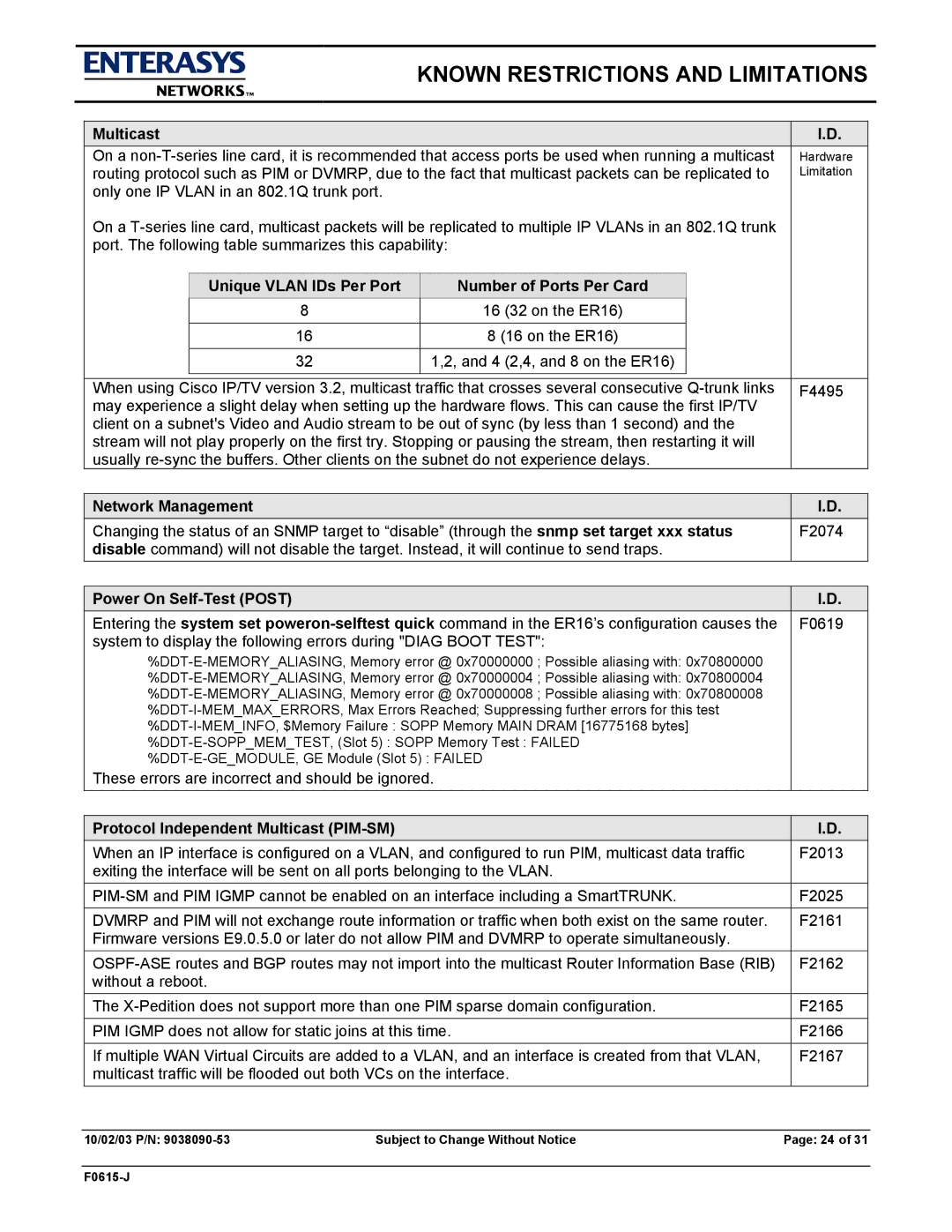
KNOWN RESTRICTIONS AND LIMITATIONS
| Multicast |
|
|
|
| I.D. | |
| On a |
| Hardware | ||||
| routing protocol such as PIM or DVMRP, due to the fact that multicast packets can be replicated to |
| Limitation | ||||
| only one IP VLAN in an 802.1Q trunk port. |
|
|
|
| ||
| On a |
|
| ||||
| port. The following table summarizes this capability: |
|
| ||||
|
|
|
|
|
|
| |
|
| Unique VLAN IDs Per Port | Number of Ports Per Card |
|
|
| |
|
|
| 8 | 16 (32 on the ER16) |
|
|
|
|
|
|
|
|
|
|
|
|
|
| 16 | 8 (16 on the ER16) |
|
|
|
|
|
| 32 | 1,2, and 4 (2,4, and 8 on the ER16) |
|
|
|
|
|
|
|
|
|
| |
|
|
|
| ||||
| When using Cisco IP/TV version 3.2, multicast traffic that crosses several consecutive |
| F4495 | ||||
| may experience a slight delay when setting up the hardware flows. This can cause the first IP/TV |
|
| ||||
| client on a subnet's Video and Audio stream to be out of sync (by less than 1 second) and the |
|
| ||||
| stream will not play properly on the first try. Stopping or pausing the stream, then restarting it will |
|
| ||||
| usually |
|
| ||||
|
|
|
|
|
|
| |
| Network Management |
|
|
|
| I.D. | |
| Changing the status of an SNMP target to “disable” (through the snmp set target xxx status |
| F2074 | ||||
| disable command) will not disable the target. Instead, it will continue to send traps. |
|
| ||||
|
|
|
|
|
|
| |
| Power On |
|
|
|
| I.D. | |
| Entering the system set |
| F0619 | ||||
| system to display the following errors during "DIAG BOOT TEST": |
|
| ||||
|
|
| |||||
|
|
| |||||
|
|
| |||||
|
|
| |||||
|
|
| |||||
|
|
| |||||
|
|
| |||||
| These errors are incorrect and should be ignored. |
|
| ||||
|
|
|
|
|
| ||
| Protocol Independent Multicast |
|
|
| I.D. | ||
| When an IP interface is configured on a VLAN, and configured to run PIM, multicast data traffic |
| F2013 | ||||
| exiting the interface will be sent on all ports belonging to the VLAN. |
|
| ||||
|
| F2025 | |||||
| DVMRP and PIM will not exchange route information or traffic when both exist on the same router. |
| F2161 | ||||
| Firmware versions E9.0.5.0 or later do not allow PIM and DVMRP to operate simultaneously. |
|
| ||||
|
| F2162 | |||||
| without a reboot. |
|
|
|
|
| |
| The |
| F2165 | ||||
|
|
|
| ||||
| PIM IGMP does not allow for static joins at this time. |
| F2166 | ||||
| If multiple WAN Virtual Circuits are added to a VLAN, and an interface is created from that VLAN, |
| F2167 | ||||
| multicast traffic will be flooded out both VCs on the interface. |
|
| ||||
|
|
|
|
|
|
|
|
| 10/02/03 P/N: | Subject to Change Without Notice | Page: 24 of 31 | ||||
|
|
|
|
|
|
|
|
|
|
|
|
|
| ||
